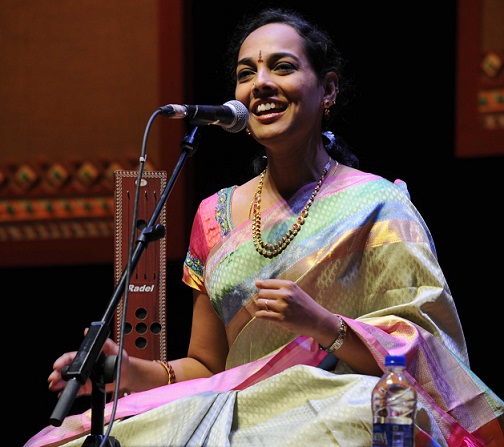Contribute
| Smt Padma Sugavanam: A Concert To Remember |
Sunanda Narayanan
05/25/2016
"Ekam Sat, Viprah Bahudha Vadanti"
"Truth is one but learned men describe it differentlyâ€
Rig Veda
This lofty theme was the framework of Smt Padma Sugavanam’s Carnatic music recital under the auspices of the Sri Lakshmi Temple on Sunday May 1st 2016. Padma is not only a highly regarded vocalist with awards and recognitions, but also a scholar of Sanskrit with several papers to her credit. Given her credentials, it was befitting that her recital be a thematic one, and she had invested much thought in the selection of pieces that gave musical form to the ideals of oneness and truth. Her succinct yet lucid introduction to each song served as the chain that linked each compositional gem to the subject. She had wonderful accompanists in Shri KVS Vinay (on the violin) and Shri Mahalingam Santhanakrishnan (on the mridangam) – both highly regarded teachers and performing artists in our Greater Boston area.
What more auspicious start to a recital than an invocation to Pranava Ganapati – the very embodiment of the primordial sound Aum? The varnam “Om Pranava Ganapati†rendered in two speeds in Mayamalavagowlai commenced the recital at a brisk pace. The well-known Paasuram “Pallaandu Pallaandu†from the Naalaayira Divya Prabhandam came next. The interesting anecdote about this composition is that it was sung as benediction to ward off the evil eye from onlookers for none other than Lord Narayana and Goddess Mahalakshmi themselves!
Being grateful for the blessing of being able to praise the Lord through music was the import of Dhanyudevvado – a composition in Malayamarutham that came next. The evocative neraval brought out the underlying humility in the lyrics and the kalpanaswaram exploration by both Padma and Vinay was adept.
Indian poets and composers have explored many a relationship with the Divine – manifesting the Supreme as parent, child, teacher, friend, beloved, and of course God. The next set of songs in Padma’s presentation delineated Ekam through these many lenses.
Adoration of the child Krishna in “Balakrishnan Paadamalar†– a gem of Papanasam Sivan in Dhanyasi came next and every sangati was sung with deep involvement. Given that the songs were in many languages, Padma’s clear enunciation of the words was a definite asset, adding much to the listener’s appreciation of the content.
Lord Subramanya is revered not only as the Guru to his own father Lord Shiva, but also as the Guru of Shri Muthuswami Dikshitar. The stately “Balasubramanyam Bhajeham†in Surati from the Kamalamba Navavarnam series was the next item. Preceded by a short, erudite alapanai, the song unfolded at a leisurely pace.
Madura Bhakti or positioning of the Divine as the beloved – an oft-explored idea in Indian poetic thought found form in Andal’s “Vaaranamayiramâ€. Set to tune in suitable ragas for each verse by Padma’s Guru Smt. Seetha Rajan, this was an enjoyable piece that noticeably resonated with many members of the audience.
Padma Sugavanam has done extensive research on the songs of Annamacharya who revered Lord Venkateshwara as the Ultimate Truth. She selected from his prolific compilation, “Palu Vichaaramulela†in Raaga Shanmukhapriya to highlight how devotees who surrender at the Lord’s feet are assured of His protection. Her expansive alapanai studded with racy prayogas delivered with clarity and elan was reminiscent of the inimitable way in which Nadaswaram artists handle this raga. Shanmkukhapriya is a grand raaga where going beyond clichéd phrases is sometimes a challenge, and Padma amply showcased her virtuosity with a full-throated rendering of both vintage and new phrases. Vinay’s interpretation was mellow and sweet, a fitting response.
Saint Tyagaraja sings of the sweetness of Lord Rama’s speech in his sugary “Paluku Kanda†set in peppy Navarasa Kanada – the piece came like a sweet palate cleanser between the heavy courses of Shanmukhpapriya and Saveri.
The Saveri alapanai with slow, weighty phrases was an appealing exploration of the contours of this emotive raaga. “Sri Pati Mukha†– a veneration of Parvati, the Mother Goddess, in the typical bhaavam-filled style of Shri Syama Sastri followed next. The neraval and kalpanaswaram elaboration was skillful and satisfying. The tani avartanam with interesting gait variations including the 5-beat Khanda nadai by Mali Santhanakrishnan was soothing and in keeping with the devotional mood of this kriti.
The concert came to a close with the melodious “Ksheerabdi Kanyakaku†in praise of Goddess Mahalakshmi – a lilting offering by this delightful team of musicians to the presiding deity of the Sri Lakshmi temple.
You may also access this article through our web-site http://www.lokvani.com/
